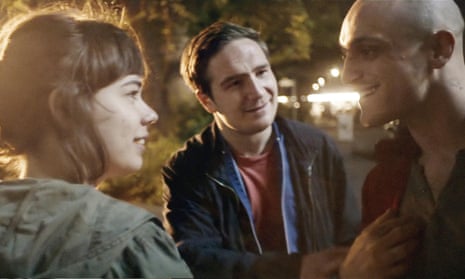Years ago, I was watching a 1950s British drama about a woman led astray by a dashing roué. It included a whirlwind montage of highlights from their wild, cosmopolitan affair: boxing matches, popping magnums, roulette wheels, flights to Paris and the glamour of the Moulin Rouge… At which point a friend nudged me and whispered: “Now that’s what I call a crammed night out.”
The young heroine of the German film Victoria really does have a busy night on the town – a mere few hours that take in flirtation, peril, dancefloor euphoria, an impromptu piano recital and, to cap it all, some reckless criminality. What’s more, director Sebastian Schipper gets it all into a taut 140 minutes – and one single continuous shot. But, more than a technical prodigy, Victoria is an authentic piece of cinematic magic. Taking us deep into one woman’s experience, it’s as adrenaline-charged as any mainstream action cinema, but with a minimum of production frills.
The film starts in a techno club in Berlin’s Mitte district around 4am; as the bass thumps and the lights flash, we spot Victoria (Laia Costa) dancing alone and carefree. She’s from Madrid, a pianist recently dropped out from conservatoire and taking time out in Berlin, working in a cafe. After a while, the camera follows her to the exit, where a dorkish-looking bloke named Sonne (Frederick Lau) sticks his head in and asks her if the club’s worth the price of admission. When Victoria leaves, Sonne is outside with three dodgy-looking pals. They spin her the weariest lines in the book, offering to show her the real Berlin. For some reason Victoria decides to join them – making us wonder whether she’s hopelessly naive, fearlessly open to anything the night will bring, or very possibly the craziest person in the picture.
As the night develops, we become aware of how confidently Schipper uses his limited time. He doesn’t pelt through the action, but paces it very effectively. We’re already quite a way into the course of events when Victoria and Sonne share an interlude of quiet intimacy, and she serenades him with a brief Liszt piano recital.
It’s now, as the film appears to be winding down, that Schipper ramps things up. The boys have urgent business to take care of, and they need Victoria to help them. As they rendezvous in a subterranean car park with the sinister, leather-faced Andi (André Hennicke), we’re suddenly thrown into deep genre territory – and it’s not spoiling anything to reveal that things, as per genre convention, don’t go according to plan.
What you won’t see coming is the nuanced set of changes in Victoria’s relationship with the guys, or the shifts in her character: from happy-go-lucky ingenue (an impression underlined by Costa’s impish, Björk-like features) to determined urban desperado, and finally to something like a tragic opera heroine. Costa gives a terrific, affecting and, by the end, intensely unsettling performance. Lau’s Sonne undergoes similar changes – starting as an oafish lunk, but once into the adventure, acquiring a muscular dash and a distinctly Brando-esque charisma.
The film doesn’t flaunt its technical bravado, so you’re never too distracted by wondering how Schipper and cinematographer Sturla Brandth Grøvlen pulled off their choreography, turning a nondescript small section of Mitte into a nocturnal playground of seemingly infinite possibility. But you do become aware of the film’s tricks with duration, as in the gang’s brief return to the club – in reality lasting just a few minutes, but feeling like a whole tournament of triumphant revelry. “Real time” in cinema has rarely been so craftily elasticised.
The art of the mad tracking shot – the seamless, sinuous take that seems to go on for ever – has become a big deal in recent years, whether outrageously faked, as in Iñárritu’s Birdman, or performed with stately rigour, as in Sokurov’s Russian Ark. While Victoria never feels like a mere bid for a championship medal, Schipper, Grøvlen and the cast and crew impress mightily with their energy, discipline and (a usually meaningless term among movie folk, but one that makes absolute sense here) commitment to “the moment”. When Victoria finally emerges into a chilly Berlin morning, we feel we’ve lived through the emotions of a lifetime with her. Mind you, having stayed in this very part of Mitte two months ago, I can tell you she’ll be lucky to find a decent breakfast round there.

Comments (…)
Sign in or create your Guardian account to join the discussion